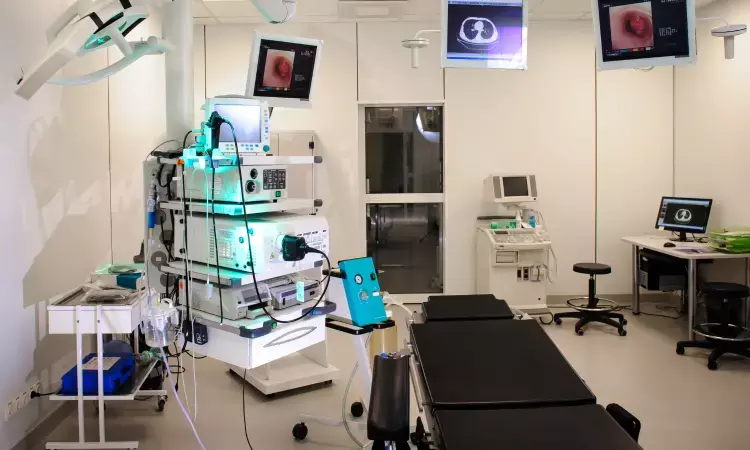- Home
- Medical news & Guidelines
- Anesthesiology
- Cardiology and CTVS
- Critical Care
- Dentistry
- Dermatology
- Diabetes and Endocrinology
- ENT
- Gastroenterology
- Medicine
- Nephrology
- Neurology
- Obstretics-Gynaecology
- Oncology
- Ophthalmology
- Orthopaedics
- Pediatrics-Neonatology
- Psychiatry
- Pulmonology
- Radiology
- Surgery
- Urology
- Laboratory Medicine
- Diet
- Nursing
- Paramedical
- Physiotherapy
- Health news
- Fact Check
- Bone Health Fact Check
- Brain Health Fact Check
- Cancer Related Fact Check
- Child Care Fact Check
- Dental and oral health fact check
- Diabetes and metabolic health fact check
- Diet and Nutrition Fact Check
- Eye and ENT Care Fact Check
- Fitness fact check
- Gut health fact check
- Heart health fact check
- Kidney health fact check
- Medical education fact check
- Men's health fact check
- Respiratory fact check
- Skin and hair care fact check
- Vaccine and Immunization fact check
- Women's health fact check
- AYUSH
- State News
- Andaman and Nicobar Islands
- Andhra Pradesh
- Arunachal Pradesh
- Assam
- Bihar
- Chandigarh
- Chattisgarh
- Dadra and Nagar Haveli
- Daman and Diu
- Delhi
- Goa
- Gujarat
- Haryana
- Himachal Pradesh
- Jammu & Kashmir
- Jharkhand
- Karnataka
- Kerala
- Ladakh
- Lakshadweep
- Madhya Pradesh
- Maharashtra
- Manipur
- Meghalaya
- Mizoram
- Nagaland
- Odisha
- Puducherry
- Punjab
- Rajasthan
- Sikkim
- Tamil Nadu
- Telangana
- Tripura
- Uttar Pradesh
- Uttrakhand
- West Bengal
- Medical Education
- Industry
Routine bronchoscopy useful in phenotyping and personalized asthma management

Researchers have concluded the safety of routine bronchoscopy in patients with severe uncontrolled asthma. They described its usefulness in phenotyping and personalized management of asthma.
The study is published in CHEST.
It is already known that SUA is treated with biological therapy if a T2 phenotype is found. Routine bronchoscopy is not a frequent recommendation in such patients. The Research question is, “Is there safety and useful in phenotyping and endotyping SUA patients before indicating biologic therapy when it comes to routine bronchoscopy?”
To answer this and elucidate further, researchers did a Prospective study of consecutive SUA patients phenotyped as T2-allergic, T2-eosinophilic and non-T2. All the relevant findings were recorded, and Cluster analysis was performed.
The study results could be summarised as follows:
- Researchers recruited 100 patients.
- Patients were classified as T2-allergic (28%), T2-eosinophilic (64%) and non-T2 (8%).
- On bronchoscopy, the signs of gastroesophageal reflux disease, vocal cord dysfunction and tracheal abnormalities were detected in 21%, 5% and 3%.
- BAS culture isolated bacteria and fungi in 27% and 14% of patients.
- Three clusters were identified: non-specific, upper airway, and infection, the latter less frequently associated with submucosal eosinophilia.
- Considering bronchial biopsies, 91% got eosinophils detected.
- Five patients with T2 phenotypes in a bronchial biopsy showed no eosinophils, and 3 with non-T2 showed eosinophils.
- Moderate bleeding was reported in only one patient.
The lead researcher Prof. Dr Borja G Cosío, MD, PhD, Respiratory medicine department, said, “Our study’s findings prove the safety of Routine bronchoscopy in SUA eligible for biologic therapy, and it can be helpful in phenotyping and personalized asthma management.
Further reading:
Redefining the role of bronchoscopy in the work-up of severe uncontrolled asthma in the era of biologics: a prospective study. https://doi.org/10.1016/j.chest.2023.03.012
BDS, MDS in Periodontics and Implantology
Dr. Aditi Yadav is a BDS, MDS in Periodontics and Implantology. She has a clinical experience of 5 years as a laser dental surgeon. She also has a Diploma in clinical research and pharmacovigilance and is a Certified data scientist. She is currently working as a content developer in e-health services. Dr. Yadav has a keen interest in Medical Journalism and is actively involved in Medical Research writing.
Dr Kamal Kant Kohli-MBBS, DTCD- a chest specialist with more than 30 years of practice and a flair for writing clinical articles, Dr Kamal Kant Kohli joined Medical Dialogues as a Chief Editor of Medical News. Besides writing articles, as an editor, he proofreads and verifies all the medical content published on Medical Dialogues including those coming from journals, studies,medical conferences,guidelines etc. Email: drkohli@medicaldialogues.in. Contact no. 011-43720751


